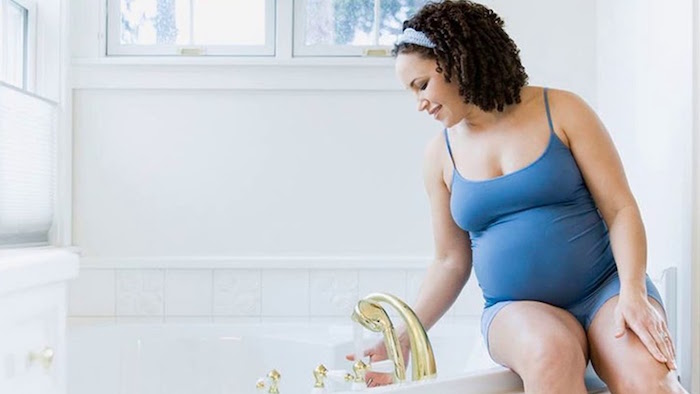You’ve probably already braced yourself for the lack of sleep you’ll get when your baby arrives, but the truth is that expectant mothers often experience this lack of sleep long before their baby even arrives.
Due to the rigours of carrying a baby, naturally, your body wants to sleep for longer and more frequently.
A poll by the National Sleep Foundation shows that 78 per cent of expectant mums has trouble sleeping. So what can you do if you’re struggling to get the necessary sleep? We’ve created this guide to show you ten ways to improve the quality of your sleep while being pregnant.
1. Sleep On Your side
When you’re pregnant, ideally you should be sleeping on your side and no doubt you already know this. When you sleep on your side, it lowers the level of pressure that’s placed onto your uterus which in turn makes it easier to breathe.
This also lowers the number of times you’ll wake up during the night and also relieves any backaches that you develop throughout the day. Refrain from laying on your back for extended amounts of time.

2. Power Down
When the human body is ready to sleep, it releases a sleep hormone called Melatonin that helps to make us feel tired.
Blue lights that are given off by screens can delay this release which can make it harder, so it’s recommended that you switch these devices off at least 30 minutes before you plan to go to sleep. Otherwise, your mind remains stimulated which can make it hard to fall asleep.
So just read a book or meditate and you’ll find that it’ll be easier for you to fall asleep.
3. Sleep in Complete Darkness
To get the best sleep, you need to make sure your environment facilitates this. You can do this by keeping your room both dark and quiet, and we mean entirely dark.
So this may mean that even small lights given off by small electrical appliances such as alarm clocks and LCDs need to be blocked out or turned to face a different direction.
Artificial light can alter the natural sleep pattern which can also disturb the optimal production of the sleep hormone Melatonin.
Additionally, keep your blinds or curtains closed, and if you live in an area where there are lots of streetlights shining into your home then alternatively you can purchase blackout curtains which completely block any light source.
4. Have a Warm Bath
Having a warm bath can be a relaxing way to end your day and get the body ready to sleep. When you have a warm bath, this draws blood away from your brain and towards the surface of the skin which gives you a relaxing feeling.
Once you remove yourself from a warm bath, the temperature of your body then falls which makes you feel tired which then helps you fall to sleep quicker. Ideally, you want the bath to be warm, because if it’s too hot, then your body temperature will rise too high which then takes away this tired feeling.
Alternatively, if you’re more of a shower person, then a warm shower also triggers the same sleep-inducing impact as a warm bath.

5. Stay Cool
One thing many expectant mums experience is that their body temperature rises because of the extra blood flow that your body has when you’re pregnant which then also increases your metabolism.
If you’re too hot, this can make it harder to fall asleep or cause you to wake up in the middle of the night overheating, so you need to address this first.
You need to keep your room cool using a range of different methods including opening windows, using a cooling fan or having a lower tog duvet which allows cool air to flow in and out, so you don’t overheat.
6. Remove Caffeine
Caffeine is a stimulant with most people consuming it first thing in the morning when they wake up or as a way to remain awake and alert throughout the day. Caffeine doesn’t enable us to replace sleep though it does make us feel more awake, by making our brain block sleep-inducing chemicals which then increases Adrenaline production.
We recommend that you remove drinks from your diet that contain caffeine including coffee and fizzy drinks. If you can’t eliminate them from your diet then at least restrict your intake to the morning or early afternoon, so there isn’t still high concentrations in your body to affect your sleep at night.
7. Use a Pregnancy Pillow
When you’re pregnant, you need more support when you sleep to feel comfortable throughout the night. A pregnancy pillow is a larger than usual pillow which has been designed specifically for expectant mothers. Because they are larger than usual, it provides significantly more support to your body’s vulnerable areas such as the back, neck and stomach.
This reduces and prevents posterior pelvic pain and lumbar pain which increases the quality of your sleep. You have to remember that it doesn‘t just benefit you, but also your baby. If you don’t have a pregnancy pillow, then alternatively you can use multiple traditionally shaped pillows to provide support to your stomach.
8. Exercise Earlier in the Day
Regular exercise is essential when you’re pregnant and a workout of just 30 minutes daily will strengthen your body in preparation for labour when delivering your baby. It doesn’t have to be strenuous, but it’s important to keep moving whether this be swimming, brisk walking or any other low impact exercise.
If you haven’t regularly exercised before then, it's advised that you first check with your doctor, and then ease your way in with 5 minutes of exercise per day and then build it up over many weeks to 30 minutes a day.
Exercising earlier in the day will tire you out making it easier to sleep at night while also improving blood circulation. It’s advised that you avoid exercising later in the day because exercise releases the hormone Adrenaline which will keep you awake when you’re trying to fall asleep.
9. Nap During the Day
If you find that you’re not getting enough sleep at night, then take naps throughout the day to avoid tiredness.
A nap should be short and no longer than 30 minutes. If you sleep longer, your body falls into a deep sleep which makes it harder to wake up and can make you feel groggy.
You don’t have to limit yourself to just one 30 minute nap either; you can take several throughout the day whenever it is suitable.
You need to get used to sleeping in short bursts because it won’t be long until your baby arrives and you’ll need to live by their sleep schedule and sleep when you can.
10. Ditch the Late Night Snacks
Eating late at night can make it harder for you to sleep because it keeps your metabolism going, and this higher metabolic rate generates heat and energy which can keep you awake and make it harder to sleep
You should aim to eat your final meal of the day two to three hours before you plan on going to sleep. But if you do get cravings, then make it a light meal that has low sugar and carbohydrates content.

